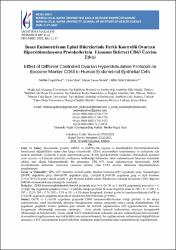İnsan Endometriyum Epitel Hücrelerinde Farklı Kontrollü Ovaryan Hipersitümulasyonu Protokollerinin Eksozom Belirteci CD63 Üzerine Etkisi
Citation
ÖNAL Melike ÖZGÜL,UYAR Yıldız,OZTURK Ulviye CANSU,VATANSEVER H. Seda İnsan Endometriyum Epitel Hücrelerinde Farklı Kontrollü Ovaryan Hipersitümulasyonu Protokollerinin Eksozom Belirteci CD63 Üzerine Etkisi. Celal Bayar Üniversitesi Sağlık Bilimleri Enstitüsü Dergisi, vol.9, no.1, 2022, ss.11 - 17. 10.34087/cbusbed.933914Abstract
Giriş ve Amaç: Eksozomlar; protein, mRNA ve miRNA’ları taşıyan ve hedefledikleri hücrelerde/dokularda fonksiyonel değişikliklere neden olan kargo sistemleridir. CD63, eksozomların tanımlanması ve izolasyonu için anahtar proteindir. Kontrollü ovaryan hiperstimülasyonu (KOH) protokollerinde kullanılan farmakolojik ajanların oosit sayısını ve kalitesini arttırarak ovulasyonu indüklediği bilinmekte fakat endometriyum hücreleri üzerindeki etkileri tam olarak bilinmemektedir. Bu çalışmada; CRL-1671 insan endometriyum hücrelerinde, KOH protokollerinde kullanılan ilaçlarının eksozom belirteci olan CD63 üzerine etkilerinin değerlendirilmesi amaçlanmıştır. Gereç ve Yöntemler: CRL-1671 hücreleri; kontrol grubu, büyüme hormonu (GH) uygulanan grup, Gonadotropin (GnTR) uygulanan grup, GH+GnTR uygulanan grup, Letrozol (L)+GnTR uygulanan grup ve üçlü kombine (L+GnTR+GH) grubu olacak şekilde 8 gün boyunca kültüre edildi. İnkübasyon sonunda hücrelerde CD63 dağılımı indirekt-immunositokimya tekniği ile incelendi. Bulgular: CD63 immunoreaktivitesinin kontrol grubunda orta (++), GnTR ve L+GnTR gruplarında kuvvetli (+++) ve diğer ilaç uygulanan gruplarda orta (++) şiddette olduğu gözlendi. H-score değerleri sırası ile 298 ± 6,71; 300 ± 5; 397 ± 12,55; 303 ± 2,74; 302 ± 5,70 ve 391 ± 4,18 olarak hesaplandı. Kontrol grubu ile karşılaştırıldığında GnTR ve L+GnTR uygulanan gruplarda istatistiksel anlamlı farklılık belirlendi (p<0.001). Sonuç: GnTR ve L+GnTR uygulanan gruplarda CD63 immunoreaktivitesinin arttığı görüldü ve bu artışın endometriyum epitel hücrelerinde eksozom biyogenezinin artması sonucunda ortaya çıktığı düşünülmüştür. GH uygulanan gruplarda kontrol grubuna göre anlamlı bir farklılık saptanmaması GH uygulamalarının eksozom biyogenezini etkilemediği sonucuna varılmıştır. Aynı şekilde letrozol kullanımının eksozom biyogenezini etkilemediği de belirlenmiştir. Sonuç olarak KOH protokollerinde kullanılan ilaçların endometriyum hücrelerindeki eksozomların regülasyonunu nasıl etkilediklerinin aydınlatılmasıyla; bu regülasyonların endometriyal değişikliklerin tanısında ve IVF çalışmalarının başarılı infertilite oranlarının değerlendirilmesinde kullanılabileceği öngörülmüştür. Objective: Exosomes are cargo systems that carry proteins, mRNAs and miRNAs and cause functional changes in the cells/tissues they target. CD63 is the key protein for the identification and isolation of exosomes. It is known that pharmacological agents used in controlled ovarian hyperstimulation (COH) protocols induce ovulation by increasing the number and quality of oocytes, but their effects on endometrial cells are not fully understood. In this study, it was aimed to evaluate the effects of drugs used in COH protocols on CRL-1671 human endometrium cells on exosome marker CD63. Materials and Methods: CRL-1671 cells were cultured for 8 days as control group, growth hormone (GH) treated group, Gonadotropin (GnTR) treated group, GH+GnTR treated group, Letrozole (L)+GnTR treated group and triple combined (L+GnTR+GH) group. At the end of the incubation, the distribution of CD63 in the cells was examined using the indirect-immunocytochemistry technique. Results: It was observed that CD63 immunoreactivity was moderate (++) in the control group, strong (+++) in the GnTR and L+GnTR groups, and moderate (++) in the other treated groups. The H-score values were calculated as 298 ± 6.71; 300 ± 5; 397 ± 12.55; 303 ± 2.74; 302 ± 5.70 and 391 ± 4.18, respectively. A significant difference was found between the GnTR and L+GnTR groups compared to the control group (p <0.001). Conclusion: CD63 immunoreactivity increased in GnTR and L+GnTR groups and this increase was thought to be due to the increase in exosome biogenesis in endometrial epithelial cells. There wasn’t significant difference between the GH treated groups and control group thus it was concluded that GH treatments did not affect the exosome biogenesis. Similarly, it was thought letrozole didn’t affect exosome biogenesis. As a result, by clarifying how the drugs used in COH protocols affect the regulation of exosomes in endometrial cells, it is predicted that these regulations can be used in the diagnosis of endometrial changes and in the evaluation of successful infertility rates of IVF studies.


















